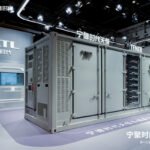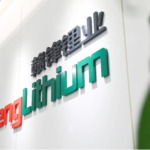On March 21, NVIDIA’s AI conference, GTC 2025, concluded in San Jose, California. As the first major global tech event in what is considered the breakout year for artificial intelligence, GTC 2025 attracted worldwide attention with its groundbreaking product launches, performance breakthroughs, and grand vision for the future of AI. These announcements provided a significant boost to companies in the chip and AI industries. However, beyond NVIDIA, nations worldwide are investing heavily to drive AI advancements, particularly in computing power, which has become a critical foundation for AI development. The sector is witnessing both an investment surge and rapid technological breakthroughs.
Shanghai Cube: A Domestic High-Density Computing System Takes Aim at NVIDIA SuperPod
In response to U.S. technology restrictions, China has accelerated its efforts in independent R&D. Recently, Shanghai Mohe Information Technology, in collaboration with leading supply chain partners, launched the Shanghai Cube, a domestically developed high-density computing system designed to rival NVIDIA’s SuperPod.
Funded by Suanfeng Information, Shanghai Cube was jointly developed by Shanghai Mohe Information Technology and top domestic technology firms, including Suanfeng Information, Luxshare Precision, Muxi Integrated Circuits, Yunhe Smart Network, Daoke Cloud, Infinite Lightyear, and Wuwen Chipscape. It represents the next generation of fully integrated domestic AI computing solutions.
The first-generation Shanghai Cube features custom OAM modules based on Muxi Xiyun C550-series high-performance GPGPU chips. It employs a high-density liquid-cooled configuration with 128 cards per cabinet. Key components include network switches equipped with Yunhe Smart Network’s domestic switching chips, a custom domestic operating system provided by Daoke Cloud, and manufacturing support from Luxshare Precision. Infinite Lightyear and Wuwen Chipscape have contributed to hardware-software optimization, ensuring seamless integration. Additionally, Shanghai Cube incorporates domestically developed liquid cooling systems, high-performance parallel storage, retimers, and capacitors. Future iterations plan to integrate domestic optical interconnects and high-speed network adapters.
Shanghai Cube’s first prototype, comprising compute nodes, management nodes, storage nodes, and network nodes, has been deployed at Fudan University’s Zhangjiang campus. Initial testing demonstrates significant optimization advantages. It has successfully powered the full-scale DeepSeek 671B AI model and supports training and fine-tuning for other mainstream AI models. The system has also been adapted for use with scientific computing and compute resource scheduling platforms.
As a direct competitor to NVIDIA’s SuperPod, Shanghai Cube’s modular integration enables it to achieve similar computing power and performance density. More importantly, it is a fully domestic alternative—its core components, including GPUs, network switches, liquid cooling systems, and operating systems, are all locally sourced. This breakthrough not only fills a gap in China’s high-density computing market but also ensures full-stack autonomy from chips to system-level integration. By addressing China’s reliance on foreign supply chains, Shanghai Cube provides a strategic advantage in the global computing race.
A Fully Integrated Solution: Strengthening China’s AI Computing Ecosystem
The AI revolution has driven demand for high-performance computing across industries, accelerating the rise of integrated AI computing appliances that combine servers, GPUs, operating systems, AI inference frameworks, and large models. However, traditional computing appliances are often assembled from heterogeneous software and hardware components supplied by different vendors, leading to compatibility challenges and inefficiencies. Much of the development effort is spent resolving integration issues rather than optimizing computing performance.
Shanghai Cube takes a different approach. Unlike traditional assembled systems, it was conceived from the ground up with a fully integrated hardware-software co-design philosophy. Instead of merely serving as suppliers, ecosystem partners became co-developers, collaborating closely from initial product architecture to final optimization. This approach ensures seamless software-hardware integration, reduced energy consumption, improved thermal efficiency, and superior high-density computing performance.
Furthermore, Shanghai Cube’s ecosystem partners are some of China’s most established technology firms. Their involvement guarantees cost efficiency, fast production cycles, and customizable functionality. The level of capital investment and supply chain coordination required to develop Shanghai Cube gives it a competitive edge that will be difficult to replicate in the short term.
Pioneering China’s AI Computing Future
China’s national policy emphasizes technology and industrial innovation as fundamental drivers of new productive forces. This means domestic computing advancements must go beyond technical breakthroughs to include industrial ecosystem development.
Shanghai Cube exemplifies this approach, offering an innovative, fully integrated hardware-software AI computing system. By breaking free from traditional constraints in computing performance, security, and sustainability, it sets a new benchmark for domestic AI infrastructure. Moreover, its deep integration with ecosystem partners not only enhances China’s computing industry but also provides a replicable model for future advancements.
Many of Shanghai Cube’s developers and suppliers are Shanghai-based companies. With China prioritizing high-quality computing infrastructure and Shanghai’s government promoting AI as a key industry, Shanghai Cube stands out as a premier example of the city’s strategy to become a global AI hub.
In an era where computing power defines economic and geopolitical strength, superior AI infrastructure determines market leadership. Those who build globally competitive, autonomous computing ecosystems will shape the future of AI. As a cutting-edge, high-density AI computing system, Shanghai Cube is set for large-scale deployment, supporting a wide range of industries and applications.
Looking ahead, Shanghai Mohe and its ecosystem partners will continue to advance China’s AI computing capabilities, strengthening the nation’s position in global AI competition.




